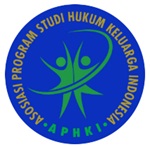Praktik Adat Kekampi Desa Pagar Agung Muara Enim dan Akibat Hukumnya Menurut Hukum Keluarga Islam
DOI:
https://doi.org/10.29240/berasan.v3i2.11892Keywords:
Islamic Law, Custom, KekampiAbstract
The purpose of the research is to find out the implementation of kekampi customs and a review of Islamic family law on kekampi customs in the village. The method used in this study is field research or qualitative (field research) collecting data directly dealing with the phenomena that occur data, namely by interview and documentation. Data analysis techniques use descriptive analysis by presenting the results of interviews and drawing conclusions deductively. The results of the study obtained are that the practice of the kekampi custom consists of several stages, namely the first is the arrival of the prospective groom, the second is the arrival of the prospective groom with his family, the third is the arrival of the woman's family to the groom's house, the fourth is gathering the family, the fifth is the cooking event and the arrival of residents, the sixth is the marriage contract, the seventh is the reception. And the legal consequences of the agreement between the two parties who carry out the kekampi custom are regarding property, residence, inheritance, and the position of the man. Therefore, Islamic law states that the marriage of kekampi custom is a custom that is not prohibited in Islamic law, but looking at the incompatibility of the legal consequences of kekampi custom, it is not in accordance with Islamic law. For this reason, kekampi custom marriage can be said to be corrupt because kekampi custom is a customary custom in which there are legal consequences in terms of property, inheritance and the position of the man that is not in line with Shari'ah.
Downloads
References
Damanik, Amsari. “Implikasi Pembatasan Usia Perkawinan Terhadap Dispensasi Kawin.” DATIN LAW JURNAL 4, no. 1 (February 1, 2023). https://doi.org/10.36355/dlj.v1i1.
M. Syaikhul Arif. “Mengenal Sistem Hukum Waris Adat.” Siyasah: Jurnal Hukum Tata Negara 5, no. 1 (2022): 22–30. http://ejournal.an-nadwah.ac.id/index.php/Siyasah/article/view/420%0Ahttp://ejournal.an-nadwah.ac.id/index.php/Siyasah/article/download/420/346.
Mu’i, Fathul. “Reinterpretasi Nafkah Dalam Undang-Undang Perkawinan Dan Implikasinya Terhadap Ketahanan Keluarga Di Masa Dan Pasca Covid-19.” International Conference on Islam, Law, and Society (INCOILS), 2021, 1–12. https://www.incoilsfdpdiktis2021.iaipd-nganjuk.ac.id/index.php/incoils/article/view/125.
Nabila, Gina, and Bunyamin. “Analisis Putusan Kumulasi Perkara Perceraian Dan Harta Bersama Di Hubungkan Dengan Undang-Undang Nomor 50 Tahun 2009 Tentang Perubahan Kedua Atas Undang-Undang Nomor 7 Tahun 1989 Tentang Peradilan Agama.” UNES Law Review 6, no. 4 (2024): 10070–77.
Najah, Nailun. “Problematika Waris Dan ’Urf Perspektif Muhammad Syahrur.” Iqtisodina 1, no. 1 (2019). http://ejournal.kopertais4.or.id/madura/index.php/IQTISODINA/article/view/4434.
Nurani, Sifa Mulya. “Relasi Hak Dan Kewajiban Suami Istri Dalam Perspektif Hukum Islam (Studi Analitis Relevansi Hak Dan Kewajiban Suami Istri Berdasarkan Tafsir Ahkam Dan Hadits Ahkam).” Al-Syakhsiyyah: Journal of Law & Family Studies 3, no. 1 (2021): 98–116. https://doi.org/10.21154/syakhsiyyah.v3i1.2719.
Shesa, Laras, Laras. “Tinjauan Hukum Islam Terhadap Sistem Kewarisan Dalam Perkawinan Bleket Suku Adat Rejang (Studi Kasus Di Desa Duku Ilir Kecamatan Curup Timur Kabupaten Rejang Lebong).” Qiyas, June 7, 2016.
Suhartawan, Budi. “Hak Dan Kewajiban Suami Istri Dalam Perspektif Al-Qur’an:(Kajian Tematik).” Tafakkur: Jurnal Ilmu Al-Qur’an Dan Tafsir 2, no. 2 (2022): 106–26. http://e-jurnal.stiqarrahman.ac.id/index.php/tafakkur/article/view/65.
Downloads
Published
Issue
Section
Citation Check
License
Copyright (c) 2025 Ifrohati Ifrohati, Rafida Ramelan, Rati Halnasia

This work is licensed under a Creative Commons Attribution-NonCommercial-ShareAlike 4.0 International License.
Authors who publish with Berasan: Journal of Islamic Civil Law agree to the following terms:
- Authors retain copyright and grant the journal right of first publication with the work simultaneously licensed under a Creative Commons Attribution-NonCommercial-ShareAlike 4.0 International License (CC BY-NC-SA 4.0) that allows others to share the work with an acknowledgment of the work's authorship and initial publication in this journal.
- Authors are able to enter into separate, additional contractual arrangements for the non-exclusive distribution of the journal's published version of the work (e.g., post it to an institutional repository or publish it in a book), with an acknowledgment of its initial publication in this journal.
- Authors are permitted and encouraged to post their work online (e.g., in institutional repositories or on their website) prior to and during the submission process, as it can lead to productive exchanges, as well as earlier and greater citation of published work (See The Effect of Open Access).









